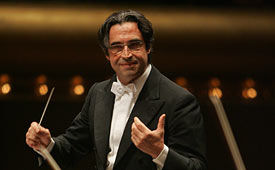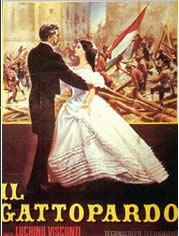Other Links
Editorial Board
- Editor - Bill Kenny
- London Editor-Melanie Eskenazi
- Founder - Len Mullenger
Google Site Search
SEEN
AND HEARD INTERNATIONAL CONCERT REVIEW
Nino Rota, Franck:
Bavarian Radio Symphony Orchestra, Riccardo Muti (conductor)
Gasteig, Munich 6.12.2007 (JFL)
Just seven weeks after
Riccardo Muti had presented choral rarities by Schubert,
Petrassi, and Berlioz he was back with the Bavarian Radio Symphony
Orchestra in a concert of music by Nino Rota and César Franck. In
between, the BRSO had toured Japan with Mariss Jansons and
Richard Strauss – and judging from the reviews with their usual,
extraordinary success.
Jens F. Laurson
Rota: ”Il Gattopardo” Symphonic Suite
Rota: Piano Concerto E-major ”Piccolo mondo antico”
Franck: Symphony in d-minor

Riccardo Muti
With Arkadi Volodos occupying the Herkulessaal on Thursday, the
BRSO played in their secondary home, the Philharmonie at the
Gasteig. (This choice between the smallish 1300 seat Herkulessaal
and the too-big, acoustically challenged 2400 seat Gasteig is the
reason why Mariss Jansons is so engaged in the BRSO getting a new,
dedicated 1800 seat concert hall, tentatively planned at the
former royal stables, right behind the opera.)
Despite the draw that is Riccardo Muti’s name and most likely
because of the lack of familiarity with either the name 'Nino
Rota' or the association of him with film music egs. The
Godfather, 8½, La Strada, the BRSO played to a
less than sold out house.
A shame, because those who stayed away missed a spectacularly bold
concert of music that only the most hardened music-snobs would not
have embraced wholeheartedly. Perhaps it is part of the irony of
the concert business that people stay away both when the fare is
too difficult but also when it is not ‘serious’ enough.
Even Claudio Abbado can’t fill the Gasteig when he adds as
harmless a piece as Pelléas et Mélisande on to a Mahler
program, just because the name 'Schoenberg' is also astutely
avoided. Similarly, if it isn’t 'Beethoven', 'Strauss' or
'Mozart' on the program but ‘only a film composer’, large swathes
of the audience won’t think it classy enough.

There was not a moment in which it did not sound like a matter of
luxury to have this music played by the BRSO under Riccardo Muti’s
caring leadership. That Muti, not known for frivolities of any
kind, thus champions Rota not only has to do with the
better-than-suspected music of the Milan-born composer who taught
at the South Italian conservatory in Bari, but also with Rota
having been Muti’s teacher whose recommendation got the then
17-year old conductor-to-be into the conservatory in Naples.
Muti seems to pay back his dues with enthusiasm and passion:
swelling and moving, the orchestra dug into this score, as well as
the following Piano Concerto, with fury. The brass boomed,
the timpani thumped, and the strings swooned.
Usually, there’s little I find more tiring than the typical
conductor’s platitude of every piece of music, regardless of
inherent worth, having to be played like it is the “best piece
ever written”. On Thursday with the BRSO and Muti though, the
statement finally came true. This shows how much respect Muti
wields with the players – and his ability to share his passion
with them: both of these
Rota
works were played as if they were the finest Beethoven.
Not that they are, mind you, but this is certainly not to say that
we shouldn’t hear either the suite or the concerto more often. The
Piano Concerto E-major "Piccolo mondo antico"
is clearly the more archaic and romantic of the
two and is a pianistic showpiece that starts out like Rachmaninov,
then moves through a slow movement of clouded joy and longing
smiles, to sound more like Ravel than anything else. The work
ends with a flashy bang after much of its third movement reminded
of the Prokofiev of Romeo and Juliet and The Love for
Three Oranges (as well as more Ravel). Seeming as it does, to
travel though all the more harmless romantic styles of the 20th
century, there is an almost obscene deliciousness here, with so
many swells and climaxes that the irony in the piece is scarcely
noticeable - at least not in Muti's confident rendition. He seems
to think that this music needs no irony for self-defense.
The young French pianist David Fray, whose
recent album of Bach and Boulez on Virgin found the warm
praise of Anthony Tommasini in the New York Times, played along
with Muti, milked the concerto to the hilt, and his perfectly
placed last chord coincided with the thundering applause of the
audience.
The second half of the concert was reserved for a dominating,
all-stops-pulled, Symphony in d-minor by César Franck. I
don’t blame the audience of the work’s premiere for not having
quite understood it. After founding the Société Nationale de
Musique with Fauré, Bizet, Saint-Saëns, Massenet, etc. to open
a new, decidedly French front against the dominance of Wagnerian
music, to champion a music that breathed the spirit of ”ars
gallica”, and after being a teacher to d’Indy, Chausson, Pierné,
Dukas, and the brilliant, mad Duparc (to whom the symphony is
dedicated), it would seem odd to present a symphony that
could not be any less French. In fact, this is a work that seems
to combine ideas and themes of Wagner, Bruckner, Brahms, Liszt,
and even Beethoven, but just not an ounce of French idiom. A few
very simple motifs are turned into a grand symphony of three
movements which sounds to me like the very rejection of everything
Franck had worked and fought for... but instead like..., well,
like Bruckner vacationing on the
Côte d'Azur.
No complaints from me though. And Muti too, seemed to be
uninterested in adding anything dainty or croissant-flavored to
this symphony. This was a militaristic and swift performance of
complete cohesion and sonority, impressive at every point, though
driven too hard in some places: not only bold and muscular, but
blaring and not much concerned with subtleties either. A
particular delight amid all this, was the pizzicato-burdened
Allegretto with its
famous cor anglais solo where the instrument gets to snarl
like depressed, moaning duck beside the harp’s diligent plucking.
